Key takeaways:
- Environmental legislation mandates adherence to water usage, waste management, and chemical runoff, promoting sustainable practices in the car wash industry.
- Successful compliance not only reduces operational costs but fosters community accountability and opens opportunities for financial incentives and grants.
- Businesses face challenges in balancing compliance with operational efficiency and educating consumers about eco-friendly practices.
- Proactive engagement with local authorities and training staff on sustainable practices enhances compliance and creates a culture of environmental responsibility.
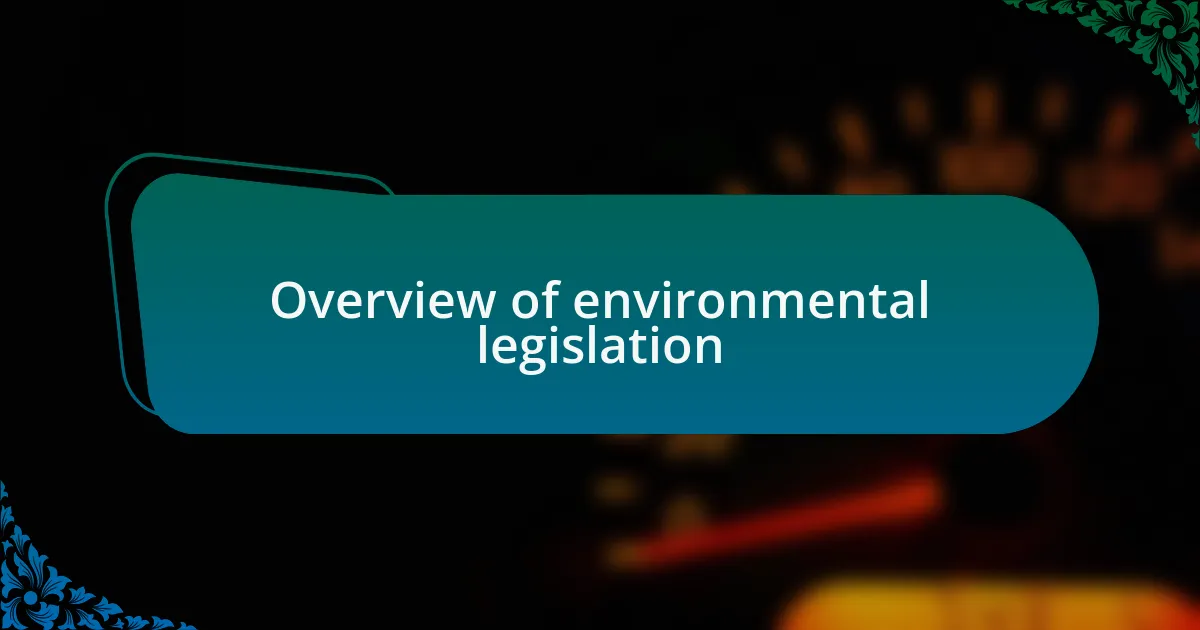
Overview of environmental legislation
Environmental legislation plays a crucial role in regulating how businesses, including car washes, interact with our natural surroundings. I remember when the first set of water-use regulations took effect in my area; it was both daunting and enlightening to navigate these new rules. It made me ponder: how can we balance operational efficiency with environmental responsibility?
These laws typically address water usage, waste management, and chemical runoff, helping to protect our ecosystems. I’ve seen firsthand how some car wash owners initially resisted these changes, questioning the need for such strict guidelines. However, embracing these regulations often leads to innovative practices that can save resources and money in the long run.
In my experience, staying informed about local environmental regulations is not just good practice—it’s vital for long-term success. I often think about how many small adjustments, like switching to biodegradable soaps or implementing water recycling systems, can make a significant impact. Isn’t it remarkable how a little effort towards compliance can lead to a cleaner environment and a more sustainable future for our communities?
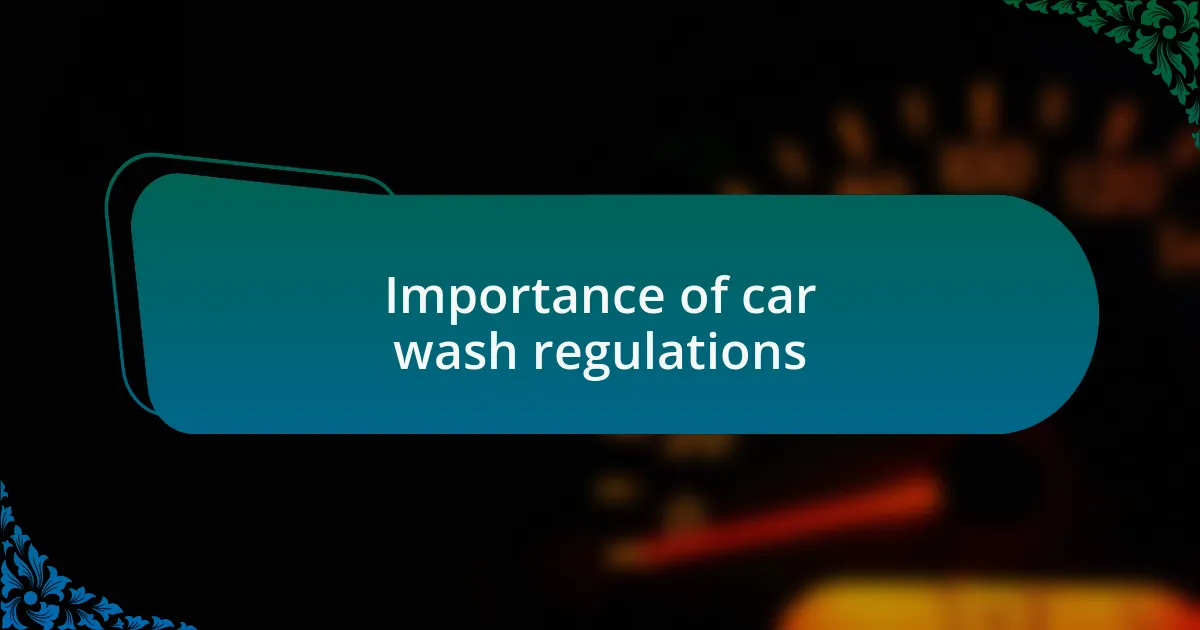
Importance of car wash regulations
Car wash regulations are essential not just for compliance, but for fostering a culture of environmental stewardship. I vividly recall talking to a fellow car wash owner who initially viewed these regulations as a hindrance. Once he implemented them, however, he discovered that reducing water waste led to lower utility bills, transforming his perspective. Isn’t it fascinating how regulations can turn what seems like an obstacle into an opportunity for improvement?
The importance of these regulations goes beyond just operational aspects; they also reflect our commitment to community health. I remember a day when a heavy rain washed contaminants from a local car wash into a nearby stream. Witnessing the impact on wildlife motivated many of us in the industry to advocate for stricter guidelines. Have you ever considered how small practices at a car wash can ripple into broader environmental effects?
Finally, embracing car wash regulations fosters a sense of accountability that resonates with customers. When I see a car wash proudly displaying its water conservation achievements, I feel a connection—not just to the business, but to a shared mission. Isn’t it rewarding to be part of an industry that actively seeks to minimize its environmental footprint? Regulations can serve as a catalyst for change, encouraging car washes to innovate and inspire others in the community.

Key components of effective legislation
Effective environmental legislation for car washes includes clear guidelines on water usage and waste management. I once participated in a workshop where industry leaders brainstormed potential regulations, and the consensus was overwhelmingly in favor of specific limits on water consumption. Isn’t it empowering to think about how precise regulations can lead to significant water savings collectively?
Another critical component is the incorporation of sustainable practices that encourage innovation. From my experience, sharing best practices, like using biodegradable soaps and recycling water, can drive progress and help car washes differentiate themselves. Don’t you think it’s inspiring when businesses take the initiative to implement green technologies, turning compliance into a badge of honor rather than a mere obligation?
Lastly, effective legislation must include regular assessments and updates to ensure it remains relevant. I recall a time when outdated regulations stifled a colleague’s efforts to adopt new eco-friendly cleaning systems. Having a dynamic framework that evolves with advancements in technology and environmental science is crucial. How often do we hear about regulations that lag behind innovation? Addressing this gap not only keeps car washes competitive but also ensures they can meet their environmental responsibilities adequately.
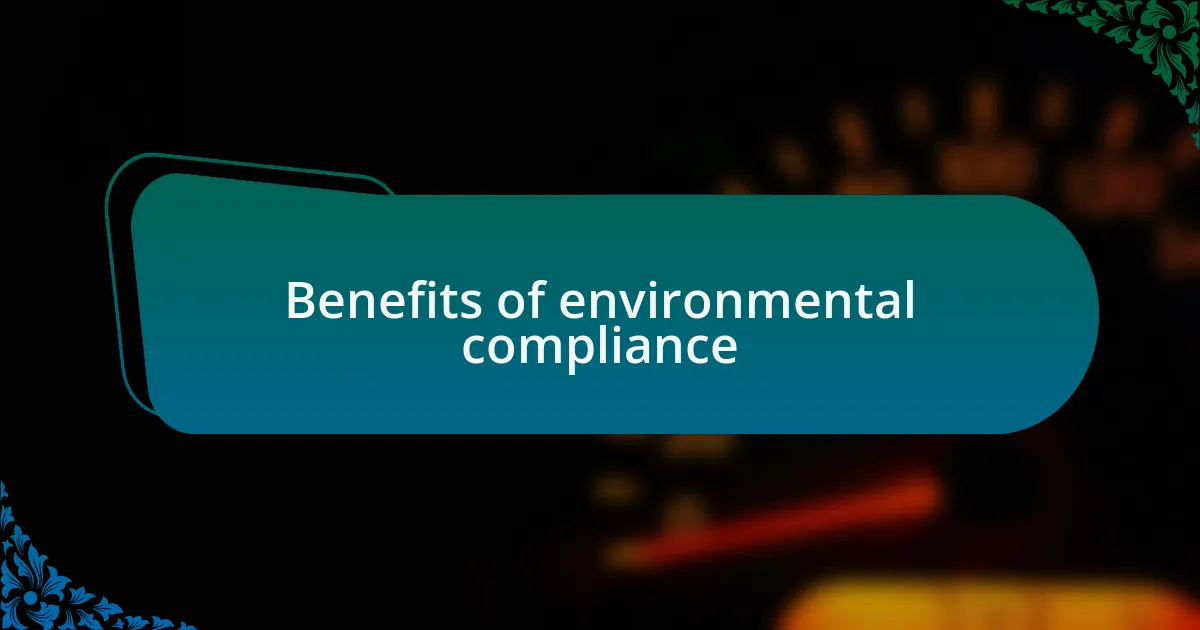
Benefits of environmental compliance
Embracing environmental compliance brings numerous benefits that extend beyond mere legality. I remember visiting a car wash that had invested in water recycling systems. The owner proudly shared how this not only cut operating costs but also attracted eco-conscious customers. Isn’t it fascinating how sustainable practices can transform a business’s image and bottom line simultaneously?
Moreover, compliance fosters a culture of responsibility and accountability within the industry. When I attended a forum discussing green initiatives, I was struck by how passionate the attendees were about minimizing their environmental impact. This shared commitment ignites a sense of community, encouraging others in the industry to step up and join the movement. How often do we witness a ripple effect when one business leads by example?
Lastly, being environmentally compliant can open doors to diverse funding opportunities and incentives. I learned firsthand about a fellow car wash operator who accessed grants specifically aimed at businesses reducing their carbon footprint. It’s a win-win situation—by investing in compliance, you’re not just doing the right thing; you’re also potentially unlocking financial benefits. Who wouldn’t want to harness such opportunities for growth?
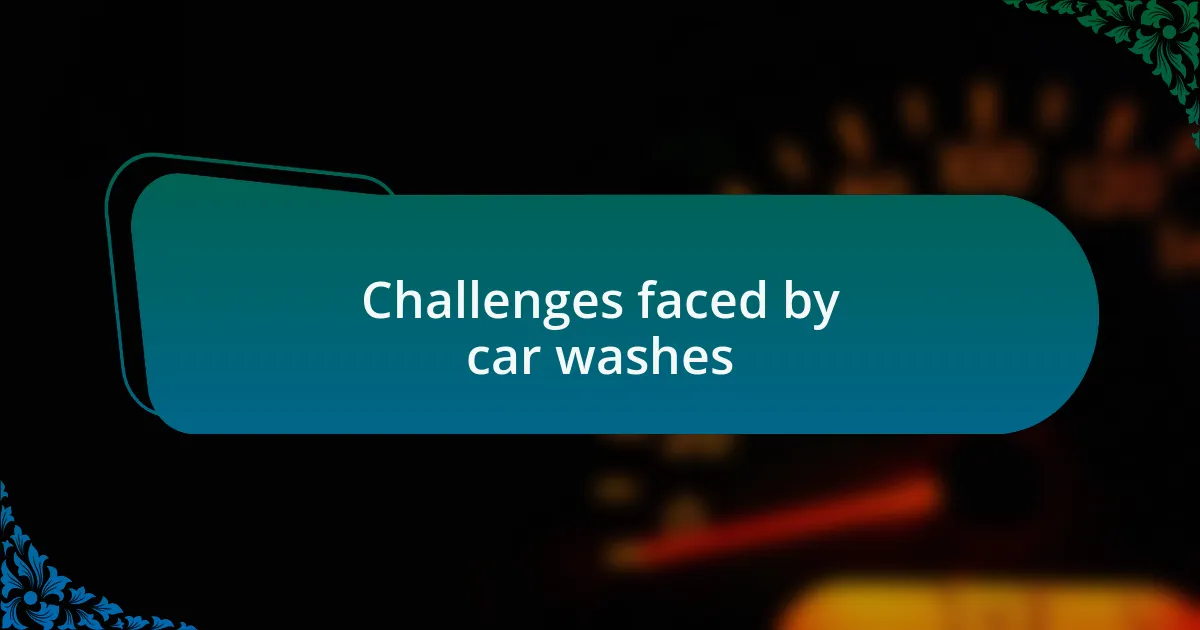
Challenges faced by car washes
Understanding the challenges faced by car washes today is crucial, especially when considering the environmental landscape. One major hurdle is the constant pressure to maintain compliance without sacrificing efficiency. I remember a conversation with a car wash owner who lamented about the increasing complexity of regulations. It often felt like juggling too many balls in the air—one wrong move, and an inspection could lead to hefty fines. Have you ever felt overwhelmed by regulations in your own line of work?
Another significant challenge is the cost associated with upgrading equipment to meet environmental standards. While some operators are eager to invest in energy-efficient washers or water recycling systems, the upfront costs can be daunting. I talked to a colleague who faced this dilemma, weighing the immediate financial strain against the long-term benefits. It’s a tricky balance—how do you prioritize growth while managing these expenses?
Lastly, there’s the ongoing struggle to educate customers about the importance of eco-friendly practices. Many consumers still prioritize low prices over sustainability, leading to a disconnect that can be frustrating for those of us advocating for greener options. I recall a day at my wash where I offered a promotion on water conservation; while some showed interest, many opted for the cheapest option available. Isn’t it interesting how changing consumer behavior can significantly impact a business’s direction?

My personal experience with legislation
Reflecting on my personal experience with legislation, I recall a time when new regulations were introduced, demanding more stringent waste management practices at my car wash. At first, I felt overwhelmed by the sheer volume of paperwork and the need to adapt almost overnight. Can you imagine trying to establish new routines while keeping up with daily operations? It was a challenging but ultimately enlightening phase.
A particularly memorable moment occurred during an audit when a minor oversight could have resulted in significant penalties. My heart raced as the inspector scrutinized our processes, but I ultimately breathed a sigh of relief when he recognized the changes we had adapted. Have you ever felt that blend of anxiety and pride when facing regulations head-on? It really highlighted for me the importance of staying informed and proactive.
Moreover, I’ve had to navigate the emotional rollercoaster of collaborating with local authorities, hoping for a balance between environmental protection and practical business operations. One time, I attended a community meeting to discuss proposed legislative changes, balancing my frustration with the need for progress. I couldn’t help but think: how can we make legislation work for us rather than against us? Engaging with these challenges has profoundly shaped my understanding of the delicate relationship between compliance and operational success in the car wash industry.
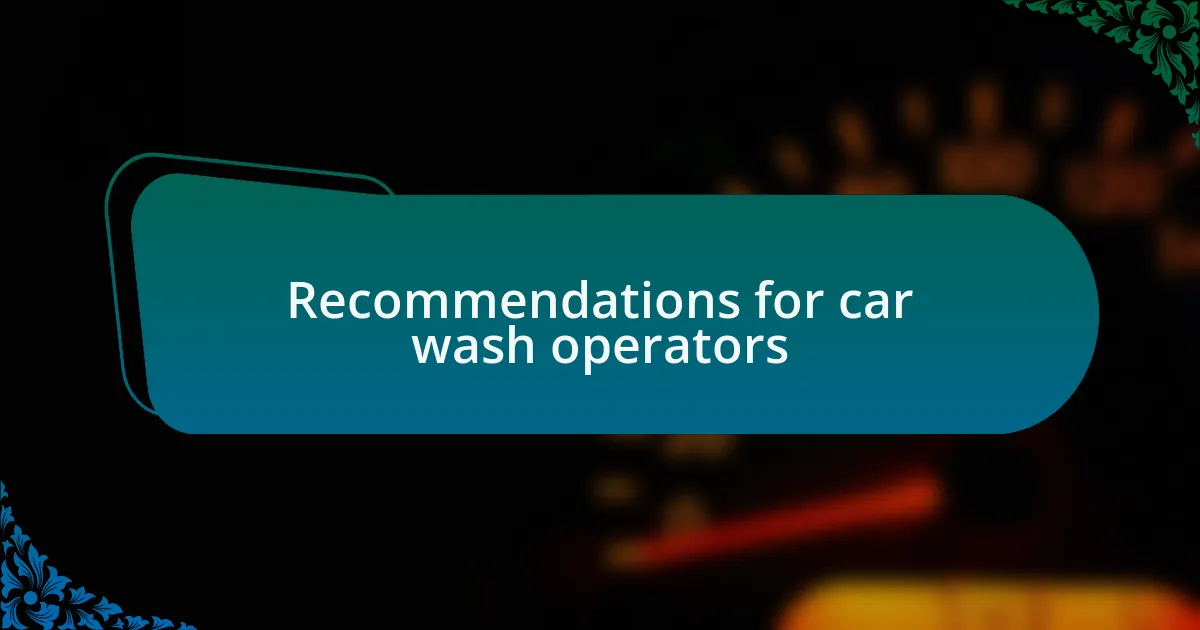
Recommendations for car wash operators
When it comes to environmental legislation, staying ahead of the curve is key for car wash operators. I recommend investing in tech solutions that monitor water usage and recycling systems. For instance, I implemented a water reclamation system which not only ensured compliance but also significantly reduced our water bill. It’s intriguing how technology can transform challenges into savings, isn’t it?
Training staff on environmental practices is equally crucial. I’ll never forget the day I held a workshop focused on sustainable practices. The team was eager to learn about how their actions could reduce our environmental impact. Their enthusiasm gave me hope and reminded me that making informed decisions starts from the ground up. Have you considered how staff engagement can foster a culture of sustainability at your operation?
Additionally, I encourage operators to foster relationships with local regulatory bodies. A dialogue can help clarify regulations and even influence future legislation. I once reached out to a local agency to discuss our practices and, to my surprise, they provided insights that shaped our operations positively. Engaging with authorities can turn fear of legislation into a collaborative effort for a cleaner environment. Have you explored this pathway in your business?